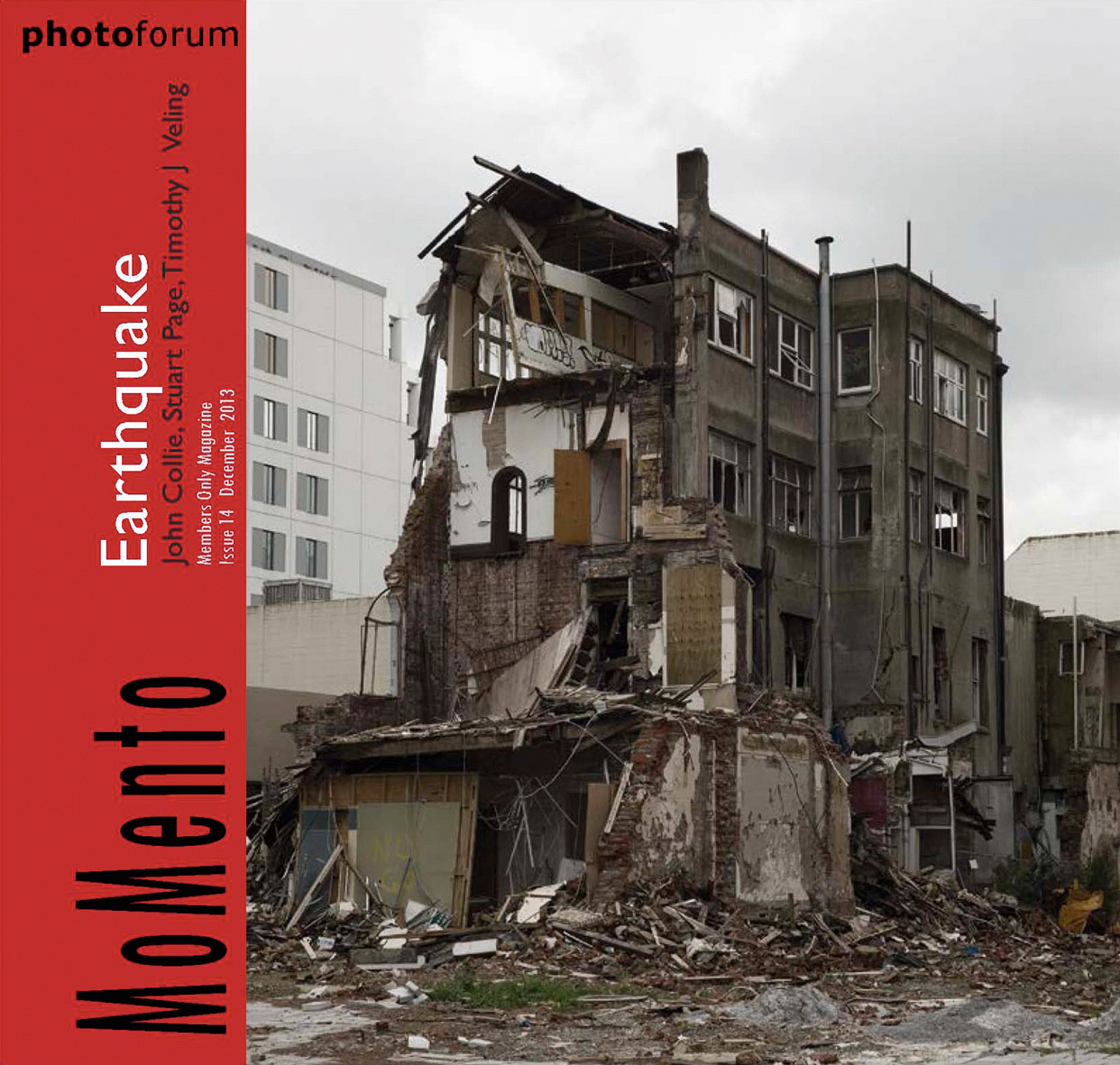PhotoForum MoMento 14 (December 2013): Earthquake. John Collie, Stuart Page, and Timothy J. Veling
PhotoForum MoMento 14 (December 2013): Earthquake. John Collie, Stuart Page, and Timothy J. Veling
PhotoForum MoMento 14: Earthquake. John Collie, Stuart Page, and Timothy J. Veling.
Edited by John Collie and John B. Turner.
Published by PhotoForum, December 2013
Earthquake
“Did the earth move for you?”, was the laconic text sent to us on the 4th of September, 2010.
A few hours earlier I’d been sitting in the dark, huddled in the hallway with my partner and
kids (who’d gone back to sleep. I’d been stabbed in the sole of the foot by a broken glass in
the rush to the kids room, and had a tea towel wrapped around it in an attempt to stop the
blood flow. I was feeling faint. The earth did actually move – really violently.
The neighbour’s chimney had smashed the rear window of our car. The city was black
and deathly silent.
I missed the even bigger quake in February 2011 as I was on leave. A few days later I
came back to Christchurch, and with a few other staff went into the Christchurch Art Gallery
where I work. After assembling at the edge of the Red Zone we were allowed through the
army cordon to rescue the freshly installed Petrus van der Velden exhibition. It was now
sharing the touring gallery with at least 80 emergency workers, rows of computers and temporary
worktables. I think the new occupants were happy when we removed these dark
brooding landscapes with their tumbling down rocks from the dimly lit walls.
Two months after the Febuary quake I was asked to photograph Neil Dawson’s Chalice
for the cover of Art News New Zealand. I set off in my hard hat and hi-visibility vest with a
guy from the parking division at council. He’d recently been seconded to his new role as Red
Zone escort. We headed into the heart of the Red Zone – Cathedral Square.
I signed in to the Zone at the checkpoint and walked up Gloucester Street, taking some
shots of the general destruction and abandonment. It felt strangely liberating – a mixture of
war zone anxiousness and a strong sense of a lonely, stark and deserted landscape. When
we arrived at the Square the Chalice looked pretty much OK, but of course Christ’s Church
Cathedral was wrecked and looking all the more Gothic with its tower half down and a
giant emergency steel structure propping up the facade and rose window. All around bits of
building had dropped off, the bells lay motionless and silent on a patch of grass in front of
me.
When entering the now accessible Cathedral Square one can watch scores of overseas
and local visitors peering through the protective fence taking numberless photographs and
having, arguably, a more religious experience of the power of nature than they ever might
have had with the rote rituals of ‘churchianity’.
While things are slowly moving on in the city centre, the same can’t be said for the
suburbs. A drive around the Avon Loop reveals broken roads, endless road cones, skewed
lamp-posts and of course, damaged houses with overgrown gardens and now graffiti and
evidence of the odd arson. The number of blank sections increases daily. This has caused a
housing crisis – less houses for residents and the workers pouring in – the locals are getting
squeezed every which way. The boy racers have competition from project managers in an
enormous fleet of shiny new four wheel drives – I didn’t know there were so many diggers,
loaders, nibblers and trenchers in existence, and wonder where will they all go after their
job is done? Will they just be buried along with the millions of tons of rubble piling up in
Burwood forest . . . ? Time will tell.
John Collie, 2013

